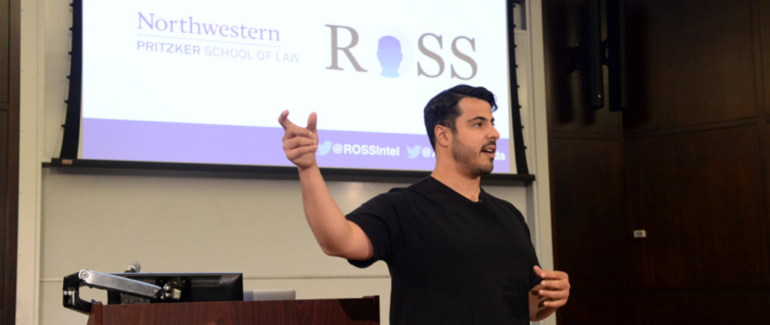By Noelle Phelan
Technology is constantly changing and many professions are changing in order to keep up with new innovations. The legal profession has remained much the same over the last several decades, but recently more schools are developing new innovative technological courses, and programs in order to assist the legal profession in changing to fit the current modern technological times.
Earlier this month, Northwestern Pritzker School of Law announced a revolutionary new program they will be entering into, in conjunction with ROSS Intelligence. ROSS Intelligence has been described as “the world’s first artificially intelligent lawyer.” It consists of an artificially intelligent system that is constantly learning and adapting in order to develop best practices and strategies that can be used to further peoples’ legal careers. Artificial intelligence in the form utilized by ROSS entails the process of training computer systems to recognize certain patterns so they can later simulate specific tasks; for example, the auto-tagging feature on Facebook photos.
The ROSS Intelligence System has evolved over the years with the corresponding surge in the capabilities of artificial intelligence through the usage of new computing powers and an increase in digital data. Data mining is used in practically every facet of life these days and the amount of digital data that exists surrounding each individual person is monumental. This data can be used for a variety of different purposes especially in the legal profession. However, ROSS Intelligence stresses the fact that using this type of artificial intelligence system is not a substitute for human action. Everything that the intelligence system does is derived from human action and human intervention. The humans in question are simply training the computers to complete basic tasks that would allow legal professionals to divert their time and energy to more important and more pressing matters.
A number of firms around the country have begun using the ROSS Intelligence System since it was first “hired” by BakerHostetler in May of 2016. ROSS was originally hired as a legal researcher for BakerHostetler. The software program scanned passages of law and would provide a hypothesis from what it had read. The lawyers working at the firm were then able to either support or refute ROSS’s hypothesis, helping ROSS to learn how to best extract relevant portions of law and testimony while minimizing the amount of time that humans working in the firm needed to spend on background legal research. In addition, once a legal professional has selected which results are pertinent and useful to meet their end, ROSS can even draft up a basic legal memo utilizing the information presented in those results.
While all of this is incredibly helpful, and can help to further integrate the legal profession with more modern technological processes, that is not the main goal of the partnership between ROSS Intelligence and the Northwestern Pritzker School of Law. The law school is planning to use ROSS Intelligence to help effectuate social justice. The school plans to use the ROSS Intelligence program in their internships and clinical programs to help a variety of legal services organizations. Many of the organizations will be used to help indigent or less fortunate persons who would otherwise have difficulty receiving access to justice. The access-to-justice gap is an extremely prevalent issue in our current day and age. Many people in our society cannot afford legal aid, nor do they have the necessary knowledge as to what aid they are entitled to.
In order to ensure that the technology is being put to good use, the school will be offering a public interest fellowship that will connect students with a variety of opportunities to use legal technology in their work, while also helping less fortunate members of the public. The school will also be partnering with organizations such as Illinois Legal Aid Online and Lawyers Trust Fund of Illinois, to help provide students with opportunities to utilize their legal tech and help underprivileged persons to attain the legal aid that they so desperately need.
Suffolk University Law School has also joined the movement linking law and technology. This past October, Suffolk announced that they had created an online certificate program that provided training in legal innovation and technology for lawyers and other professionals in a variety of different legal settings. This program will be taught by Lucy Bassli, assistant general counsel of Microsoft, who hopes that this course will allow attorneys and other legal professionals to implement technological advancements in legal services. The legal operations course will provide strategies and methods by which legal professionals can learn how to innovate the delivery of their services. The program will be made up of online courses in areas such as legal operations, design thinking, process improvement and legal project management.
Student Bio: Noelle is a staff member on the Journal of High Technology Law. She is currently a 3L at Suffolk Law. She possesses a B.A. in English and Sociology and a Criminal Justice certificate from the University of Massachusetts Amherst.
Disclaimer: The views expressed in this blog are the views of the author alone and do not represent the views of JHTL or Suffolk University Law School.

